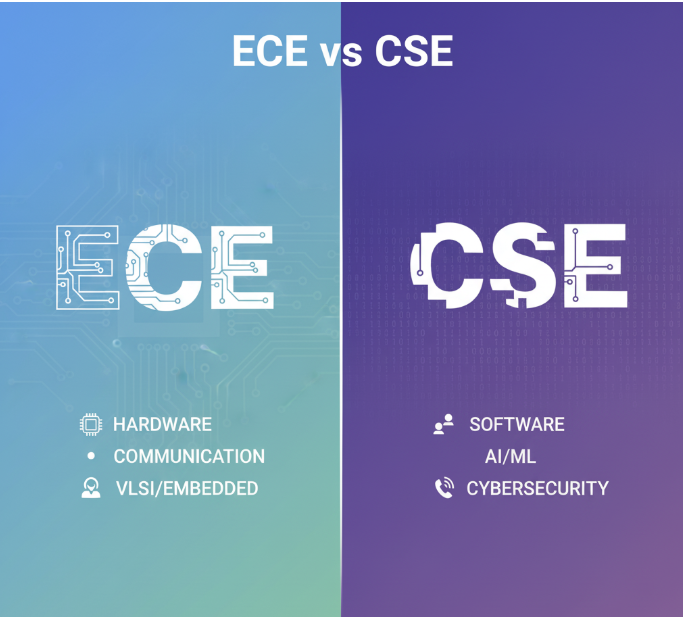ECE vs CSE: Aspiring engineers must make the crucial choice between Computer Science and Engineering (CSE) and Electronics and Communication Engineering (ECE). Despite the fact that both disciplines provide excellent career prospects, their interests and skill sets are different. Designing, creating, and maintaining electronic circuits, devices, and communication systems is the main focus of the hardware-focused field of electrical and computer engineering (ECE). Graduates can find possibilities in a range of industries, such as robots, embedded systems, telecommunications, and VLSI (Very-Large-Scale Integration) design, in addition to being well-suited for jobs in public sector organizations (PSUs) like ISRO and DRDO.
On the other hand, CSE is a software-focused field that focuses on computer applications and programming. Because of the IT industry's explosive growth, there is a great need for CSE professionals, who can pursue high-paying jobs as cybersecurity specialists, data scientists, software developers, and AI engineers. Although CSE often offers more initial compensation and a greater selection of private sector employment, ECE gives graduates a flexible foundation that enables them to work in both the IT and core hardware industries. Your passion will ultimately determine the best option, whether you like writing the code that gives technology its intelligence or designing the hardware that drives it.
What Does ECE Stand For?
-1757571091128.png)
Designing, creating, and maintaining electronic systems, circuits, and communication technologies is the core emphasis of the broad technical field known as Electronics and Communication technical (ECE). ECE serves as an essential link between the digital world of software and the physical world of hardware. This makes it a highly broad topic with applications ranging from commonplace gadgets like computers and cellphones to cutting-edge systems like robotics, satellites, and the Internet of Things (IoT).
The complete ECE curriculum combines knowledge of programming languages with the fundamentals of electrical systems, electronics, and communication technologies. Because of this special combination, graduates are able to work on both the software that controls technology and the fundamental hardware that drives it. Because of this, ECE specialists are in great demand across a wide range of sectors, such as software development, IT, telecommunications, and core electronics, providing them with a multitude of employment options worldwide. Their knowledge is crucial for influencing how innovation and modern technologies develop in the future.
What Does CSE Stand For?

Computer Science and Engineering (CSE) is a highly sought-after engineering discipline that focuses on the theoretical foundations of computation and the practical implementation of computer systems. While ECE places more of a focus on hardware, CSE is more focused on software and covers a wide range of subjects, such as data structures, programming, algorithms, and software development.
Graduates of CSE programs are at the front of the digital revolution, specializing in cutting-edge fields such as data science, cybersecurity, machine learning, and artificial intelligence. Through the development of strong coding abilities and logical reasoning, the program equips students to create software systems that address challenging real-world issues. CSE specialists are in high demand due to the IT industry's explosive growth and the continuous digital transformation occurring in all sectors.
ECE vs CSE: Key Differences

If you want to pursue any of these engineering specialties, it will be extremely challenging to succeed in both ECE and CSE if you are unable to comprehend the concepts and themes. The following table provides a thorough overview of the curriculum for both ECE and CSE:
| Factors | ECE (Electronics & Communication Engineering) | CSE (Computer Science & Engineering) |
| Core Focus | Electronics, Hardware, Communication Systems | Software, Programming, Computer Applications |
| Nature of Work | Designing circuits, working with embedded systems, telecom & hardware | Developing software, coding, data management, AI/ML |
| Coding Requirement | Moderate (C, C++, Python basics) | High (DSA, Java, Python, C++, etc.) |
| Subjects | Digital Electronics, Analog Circuits, Signals, VLSI, Embedded Systems | Data Structures, Algorithms, DBMS, OS, AI, ML |
| Job Opportunities | Telecom, Electronics, VLSI, Robotics, Embedded Systems, IT | Software Development, Data Science, AI/ML, Cybersecurity |
| Placements | Core electronics companies + IT companies | Mostly IT/software companies & startups |
| Average Salary (India) | 4 – 10 LPA | 6 – 18 LPA |
| Future Scope | 5G/6G, IoT, Robotics, Chip Design, Embedded Systems | AI, Cloud Computing, Blockchain, Cybersecurity |
| Flexibility | Can shift to IT/software roles | Difficult to move into core electronics roles |
| Top Recruiters | ISRO, DRDO, Intel, Qualcomm, Samsung, Infosys, TCS | Google, Microsoft, Amazon, Meta, Infosys, Wipro, IBM |
Future Scope and Demand
Both CSE and ECE graduates have bright futures, but their paths of development are different. A major factor driving the need for computer science and engineering (CSE) personnel is the speed at which all industries are going digital. Experts in cutting-edge disciplines like artificial intelligence (AI), machine learning (ML), data science, cybersecurity, and cloud computing are in high demand as technology becomes more pervasive in daily life. This makes CSE a clear path to high-growth, high-paying IT jobs, with a steady flow of openings at startups and multinational corporations (MNCs).
Electronics and Communication Engineering's (ECE) future scope is changing dramatically, especially in light of the global emphasis on hardware innovation. Because of developments in important fields including 5G networks, the Internet of Things (IoT), VLSI design, semiconductor manufacturing, and robotics, there is a growing need for qualified ECE graduates. ECE specialists are in high demand as a result of India's efforts to establish itself as a global center for the production of semiconductors and electronics. Because ECE is an interdisciplinary area, graduates can readily transition into software and IT employment, making them extremely adaptable even though the key functions in the field are less concentrated in the software industry.
Also Check:
Top IIT Colleges That Offer Data Science Courses to Learn Online in 2025
Best Free AI Courses for Beginners in 2025
Best Pharmacy Colleges in India 2025 After 12th Offering High Job Placement
To stay updated on current trends, join the Jagran Josh Telegram Community!
